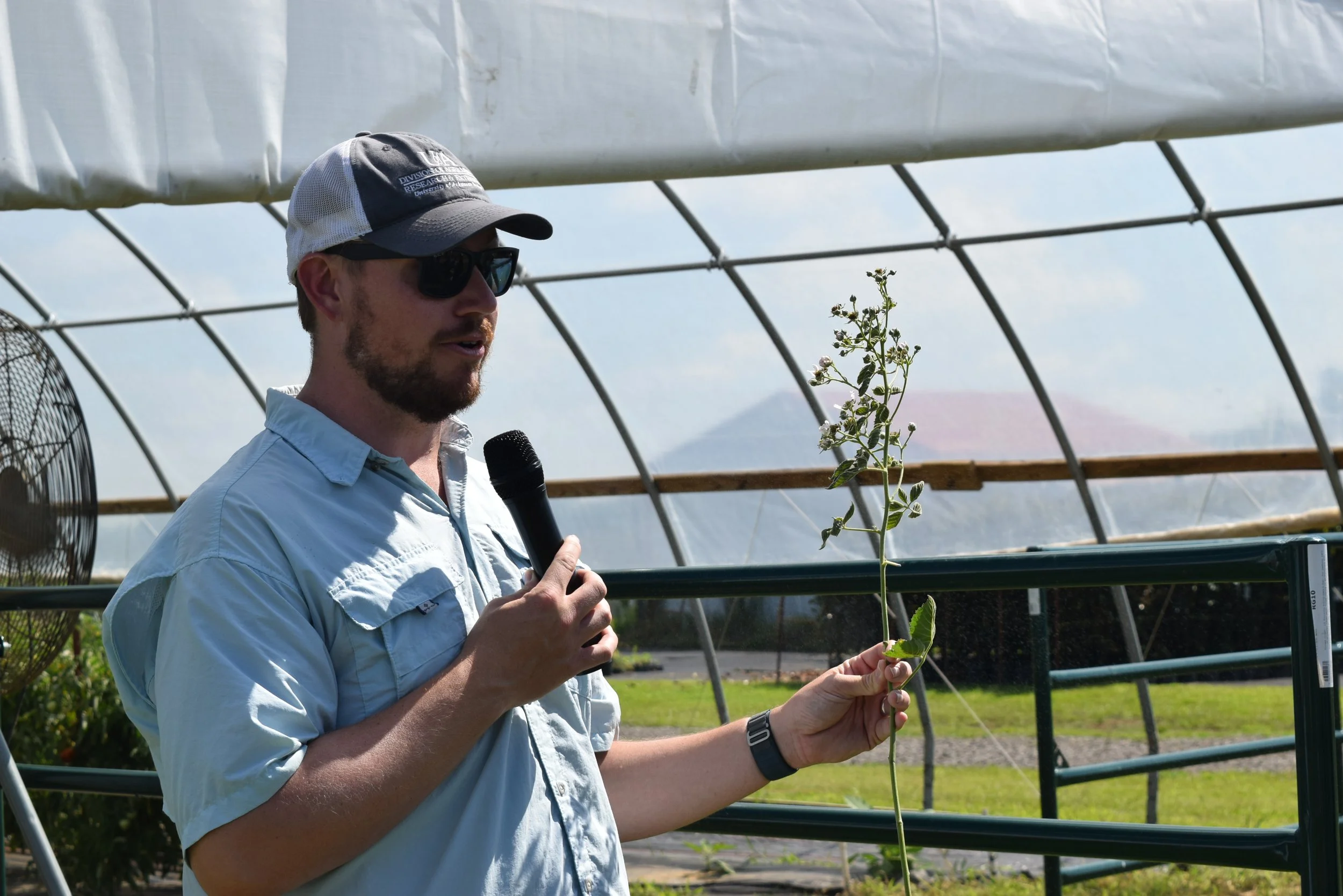By Sarah Cato
U of A System Division of Agriculture
HOPE, Ark. — Last week 97 growers, gardeners and horticulture enthusiasts headed to Hope, Arkansas to hear about fruit, vegetable and ornamental research being conducted at the Southwest Research and Extension Center.
MITEY DAMAGING — Division of Agriculture's Aaron Cato talks increased mite pressure in high tunnel grown blackberries at the 2024 Horticulture Field Day. (Division of Agriculture photo.)
The 2024 Horticulture Field Day featured extension specialists, educators and county agents with the University of Arkansas System Division of Agriculture. They covered topics including pest management, produce washing, nutrition and more.
“We enjoyed being able to show off the hard work being done on our station,” said Daniel Rivera, director of the Southwest Research and Extension Center. “We have a lot of young faculty conducting research here and I’m glad we were able to highlight them to our local stakeholders.”
Managing melonworm in pumpkins
Aaron Cato, extension horticulture integrated pest management specialist for the Division of Agriculture, gave an overview of recent research targeting key pests of pumpkins and tomatoes in Arkansas. Recent data from Cato’s pumpkin trials suggest there may be cultural control options for melonworms, a major pest in Arkansas pumpkins.
“We trialed eight varieties of pumpkins that are derived from four different species of cucurbits,” Cato said. “We found that all varieties derived from Cucurbita pepo, including all of the jack-o-lanterns we grow, are highly attractive to melonworm. Some pumpkin varieties from Cucurbita moschata and Cucurbita maxima, including varieties like Jarrahdale and Fairytale, did not attract melonworm.”
Cato said with this data, growers can tailor melonworm management to fit their operation, potentially decreasing the number of pesticide applications needed.
“This tells us that not all pumpkins need to be controlled the same when considering melonworm,” Cato said. “We are currently working on cultural controls and thresholds for using insecticides in susceptible jack-o-lantern varieties.”
Cato said the goal of this project is to create a framework for growing damage-free pumpkins in Arkansas.
Insect management in tomatoes
Cato and his team have been trialing insecticide efficacy in tomatoes at the SWREC for four years and have found that many go-to products for tomato producers may not be as effective as once thought.
“We’ve found a number of common insecticides that we use now don’t control tomato fruitworm very well, including pyretheroids like Warrior,” Cato said. “However, newer products like Coragen and Proclaim have been established as standards for fruitworm control in Arkansas tomato production.”
For other common tomato pests, good news may be on the horizon with a new product potentially hitting the shelves within the next few years.
“One issue growers commonly face is how to control a combination of pests including tomato fruitworm, stinkbugs and spider mites, which are common at the same time in South Arkansas,” Cato said. “We have been trialing an unregistered pesticide, Plinazolin, for three years and it has shown great efficacy controlling all three of these pests. This level of control in one product across all three of these pests is something we’ve never had before.”
Cato said he is hopeful the product will hit the market for tomatoes in the next one to two years.
High tunnel production
Taunya Ernst, high tunnel and urban agriculture educator for the Division of Agriculture, gave an overview of pros and cons of high tunnel production in the southeast and Mid-South.
“One of the biggest advantages we get from using high tunnels is season extension,” Ernst said. “We can go to market earlier and stay longer, extending farm revenue periods.”
High tunnels also offer protection from adverse weather and allow growers to produce high quality produce with greater predictability. One major disadvantage, however, is increased pest and disease pressure.
“While the environment inside the high tunnel can promote faster plant growth, it also favors rapid reproduction of many insect pests,” Ernst said. “And while we may see a decrease in diseases spread by splashing water, the more humid environment in the tunnel will be more favorable for other common diseases like botrytis.”
However, Ernst said by implementing effective management strategies like ventilation and crop rotation, disease pressure in a high tunnel can be lessened. Ernst has outlined these management strategies, as well as more information on high tunnel production, on the Cooperative Extension Service website.
Arkansas Diamonds
Extension ornamental specialist Anthony Bowden gave attendees a tour of in trials for the Arkansas Diamond Program. This program is a partnership of the Arkansas Green Industry Association, the Division of Agriculture, local growers and independent garden centers designed to identify and promote plants that grow well in Arkansas’ climate. Bowden noted some changes to the program for 2025.
“Edible plants, such as peppers, have historically not been included in the Arkansas Diamond Program and that’s going to change in 2025,” Bowden said. “Also beginning next year, we are transitioning from a one-year trialing period to a two-year period to better gauge how these plants perform in the state long term.”
The Arkansas Green Industry Association lists all current Arkansas Diamond plants and participating nurseries on their website.
Mention of brand names does not imply endorsement by the University of Arkansas System Division of Agriculture.
To learn about extension programs in Arkansas, contact your local Cooperative Extension Service agent or visit www.uaex.uada.edu. Follow us on X and Instagram at @AR_Extension. To learn more about Division of Agriculture research, visit the Arkansas Agricultural Experiment Station website: https://aaes.uada.edu. Follow on X at @ArkAgResearch. To learn more about the Division of Agriculture, visit https://uada.edu/. Follow us on X at @AgInArk.


